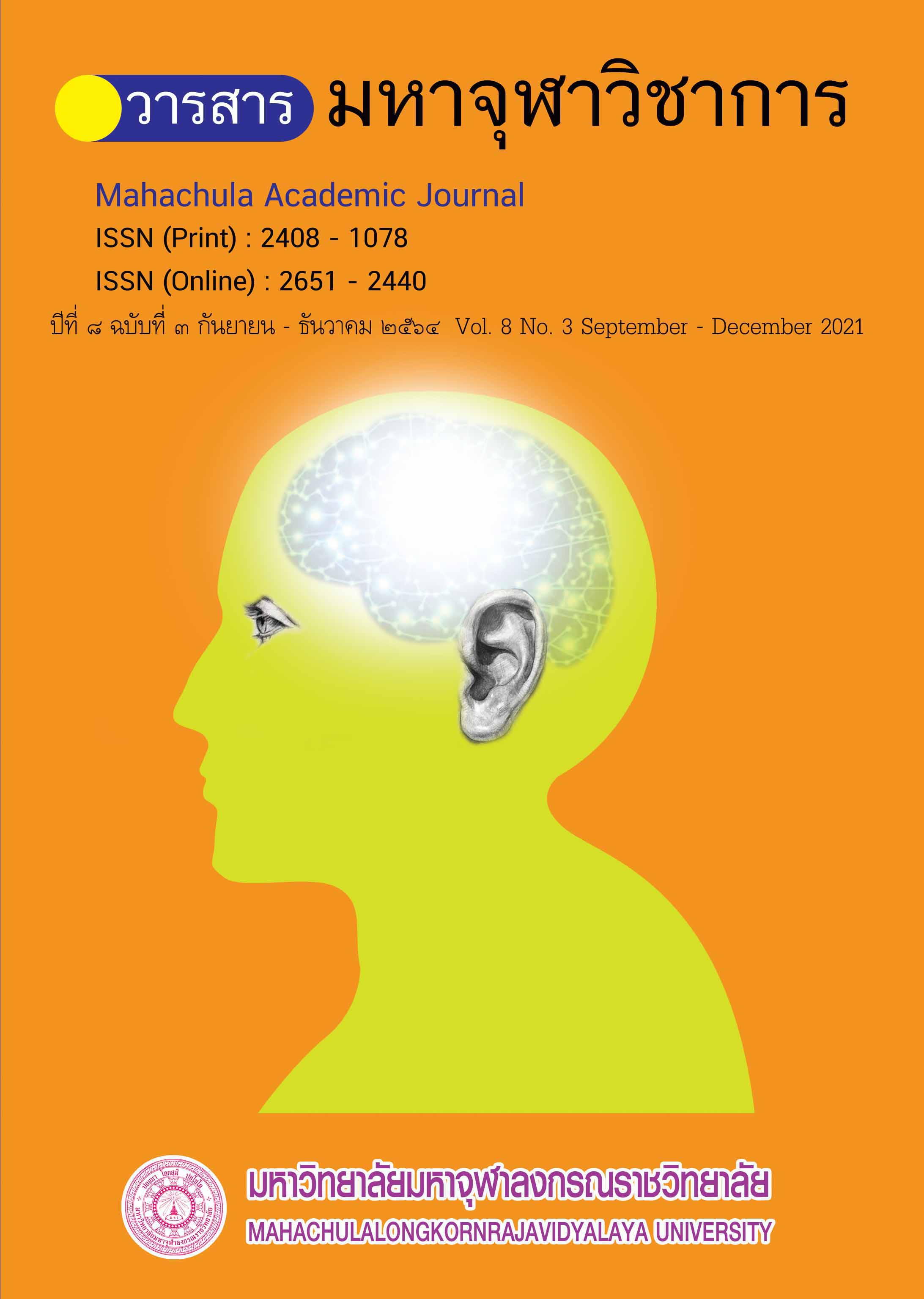School Administrators Kalayanamitra Leadership for Development of Teachers Instruction
Main Article Content
Abstract
School administrators leadership influences teachers instructional efficiency, which also results in pupils’ learning. So, administrators should use their leadership to inspire the teachers under their supervision, to develop the instructional efficiency for pupils’ efficient learning. The leadership which administrators should use for teachers’ development is Kalayanamitra leadership, or the friendly leadership as Lord Buddha’s one. This kind of leadership has some significant features, as follows. First, Lord Buddha had a clear objective of his leadership. He would like to lead human beings to get out of suffering, by performing his duty as a good friend, directing human beings to the destination, namely being freed from suffering, by themselves, with faiths. The faiths mentioned here were the one Lord Buddha had in human beings and the one human beings had in him. As a good friend, Lord Buddha helped humand beings to learn and train themselves to get out of suffering with the two virtues he possessed, Sappurisa-dhamma and Kalyanamitra-dhamma. If school administrators would like to apply Lord Buddha’s Kalyanamitra leadership with teachers’ instructional development, they must first follow Lord Buddha’s performance, by developing their qualification of being good friends. Namely, the administrators should develop themselves as the leaders of instruction with knowledge and expertise as a result of their real practice. Then, they can provide teachers with advice and help and can really perform as the good models for the teachers’ instructional development. Beside the administrators can show the teachers the way to improve the instruction, which they have successfully implemented, as good guideline. In addition, the administrators should also make use of both kinds of faiths, the one they have in teachers and the one teachers have in them. The administrators should also perform their duties as good friends to teacher, by helping the teachers to learn and improve their instruction on their own until they get successful, as guided by the administrators, with the two virtues the administrators have, Sappurisa-dhamma and Kalyanamitra-dhamma.
Article Details
References
เกรียงไกร ยิ่งยง. “ภาวะผู้นำแบบรับใช้ของผู้บริหารที่ส่งผลต่อความเป็นเลิศของโรงเรียนคาทอลิค สังกัด สังฆมณฑลนครราชสีมา”. วารสารศึกษาศาสตร์ มหาวิทยาลัยบูรพา. ปีที่ ๒๔ ฉบับที่ ๑ (มกราคม-เมษายน ๒๕๕๙) : ๑๕๐-๑๕๑.
บรรพต รู้เจนทร์. “ภาวะผู้นำทางการเรียนการสอนที่ส่งผลต่อสมรรถนะครูในสถานศึกษา สังกัดองค์การบริหารส่วนจังหวัดนครราชสีมา”. วารสารศาสตร์มหาวิทยาลัยขอนแก่น. ปีที่ ๓๘ ฉบับที่ ๒ (เมษายน-มิถุนายน ๒๕๕๘) : ๑๕๔-๑๕๖.
ประทิน พันธา. “ภาวะผู้นำทางวิชาการกับการบริหารกลยุทธ์ของผู้บริหารสถานศึกษาสังกัดองค์กรปกครองส่วนท้องถิ่น”. วารสารบริหารการศึกษามศว. ปีที่ ๑๔ ฉบับที่ ๒๖ (มกราคม-มิถุนายน ๒๕๖๐) : ๕-๖.
ฉัฏฐมณฑน์ ฟักแย้ม. “รูปแบบภาวะผู้นำทางวิชาการที่มีประสิทธิผลของผู้บริหารสถานศึกษา สังกัดองค์การบริหารส่วนจังหวัดนนทบุรี”. วารสารบริหารการศึกษา มศว. ปีที่ ๑๔ ฉบับที่ ๒๖ (มกราคม-มิถุนายน ๒๕๖๐) : ๑๓๖.
พระธรรมปิฏก (ประยุทธ์ ปยุตโต). พุทธธรรม. กรุงเทพมหานคร : โรงพิมพ์มหาจุฬาลงกรณราชวิทยาลัย, ๒๕๕๓.
พระธรรมปิฏก (ประยุทธ์ ปยุตโต). ภาวะผู้นำ : ความสำคัญต่อการพัฒนาคน พัฒนาประเทศ. กรุงเทพมหานคร : โรงพิมพ์พระพุทธศาสนา ธรรมสภา, ๒๕๔๖.
ภัทรกร วงศ์สกุล. “ภาวะผู้นำการเปลี่ยนแปลงกับประสิทธิผลของการบริหารโรงเรียน”. วิทยานิพนธ์มหาวิทยาลัยธุรกิจบัณฑิต, ๒๕๕๕.
สนธิชัย ระยับศรี. “คุณลักษณะผู้นำแบบกัลยาณมิตรของผู้บริหารสถานศึกษาตามการรับรู้ของครูผู้สอนโรงเรียนเครือข่าย ๕๘ สังกัดกรุงเทพมหานคร”. วิทยานิพนธ์การบริหารการศึกษา มหาวิทยาลัยบูรพา, ๒๕๕๔.
สมศรี พิมพ์พิพัฒน์. “การบริหารเพื่อความเป็นเลิศของสถานศึกษาขนาดเล็ก สังกัดกรุงเทพมหานคร”. วารสารบริหารการศึกษา มศว. ปีที่ ๑๔ ฉบับที่ ๒๖ (มกราคม-มิถุนายน ๒๕๖๐) : ๔๕-๔๖.
เสกสรรค์ สมศรี. “การพัฒนาโปรแกรมเสริมสร้างภาวะผู้นำแบบรับใช้ของผู้บริหารสถานศึกษาคาทอลิค สังกัดสังฆมณฑลอุบลราชธานี”. วารสารสถาบันวิจัยและพัฒนามหาวิทยาลัยมหาสารคาม. ปีที่ ๗ ฉบับที่ ๑ (มกราคม-มิถุนายน ๒๕๖๓) : ๓๑๗.
อภิชญา พูลโภคผล และชวน ภูรังกูล. “ความสัมพันธ์ระหว่างภาวะผู้นำทางวิชาการของผู้บริหารสถานศึกษากับประสิทธิผลของสถานศึกษา สังกัด สังฆมณฑลราชบุรี”. วารสารวิทยาลัย แสงธรรม. ปีที่ ๑๒ ฉบับที่ ๑ (มกราคม-มิถุนายน ๒๕๖๓) : ๑๐๗.
อำภาพรรณ ตันตินาครกูล. “ภาวะผู้นำทางการเรียนการสอนของผู้บริหารโรงเรียนในศตวรรษที่ ๒๑”. วารสารวิจัยและพัฒนาหลักสูตรมศว. ปีที่ ๑๕ ฉบับที่ ๑ (มกราคม-มิถุนายน ๒๕๕๘) : ๑๖.
Ash, R.& Persall, M. The Principal as Chief of Learning Officer : Developing Teacher Leader. National Association of Secondary School Principals, 2000.
Halverson, R & Dikkers, S. Formative Leadership for Learning : Leveraging Empirical Studies of Educational Leadership for Formative Tools, University of Wisconsin Medison, 2012.


